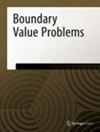Advanced neural network approaches for coupled equations with fractional derivatives
IF 1.7
4区 数学
Q1 Mathematics
引用次数: 0
Abstract
We investigate numerical solutions and compare them with Fractional Physics-Informed Neural Network (FPINN) solutions for a coupled wave equation involving fractional partial derivatives. The problem explores the evolution of functions u and v over time t and space x. We employ two numerical approximation schemes based on the finite element method to discretize the system of equations. The effectiveness of these schemes is validated by comparing numerical results with exact solutions. Additionally, we introduce the FPINN method to tackle the coupled equation with fractional derivative orders and compare its performance against traditional numerical methods. Key findings reveal that both numerical approaches provide accurate solutions, with the FPINN method demonstrating competitive performance in terms of accuracy and computational efficiency. Our study highlights the significance of employing FPINNs in solving fractional differential equations and underscores their potential as alternatives to conventional numerical methods. The novelty of this work lies in its comparative analysis of traditional numerical techniques and FPINNs for solving coupled wave equations with fractional derivatives, offering insights into advancing computational methods for complex physical systems.分数导数耦合方程的高级神经网络方法
我们研究了涉及分数偏导数的耦合波方程的数值解法,并将其与分数物理信息神经网络(FPINN)解法进行了比较。我们采用了两种基于有限元法的数值近似方案来离散方程系统。通过比较数值结果和精确解,我们验证了这些方案的有效性。此外,我们还引入了 FPINN 方法来处理具有分数导数阶的耦合方程,并将其性能与传统数值方法进行了比较。主要研究结果表明,这两种数值方法都能提供精确的解,而 FPINN 方法在精确度和计算效率方面表现出了竞争力。我们的研究凸显了使用 FPINN 解决分数微分方程的重要性,并强调了 FPINN 作为传统数值方法替代品的潜力。这项工作的新颖之处在于对传统数值技术和 FPINNs 在求解带分数导数的耦合波方程中的应用进行了比较分析,为复杂物理系统计算方法的发展提供了启示。
本文章由计算机程序翻译,如有差异,请以英文原文为准。
求助全文
约1分钟内获得全文
求助全文
来源期刊

Boundary Value Problems
MATHEMATICS, APPLIED-MATHEMATICS
CiteScore
3.00
自引率
5.90%
发文量
83
审稿时长
4 months
期刊介绍:
The main aim of Boundary Value Problems is to provide a forum to promote, encourage, and bring together various disciplines which use the theory, methods, and applications of boundary value problems. Boundary Value Problems will publish very high quality research articles on boundary value problems for ordinary, functional, difference, elliptic, parabolic, and hyperbolic differential equations. Articles on singular, free, and ill-posed boundary value problems, and other areas of abstract and concrete analysis are welcome. In addition to regular research articles, Boundary Value Problems will publish review articles.
 求助内容:
求助内容: 应助结果提醒方式:
应助结果提醒方式:


